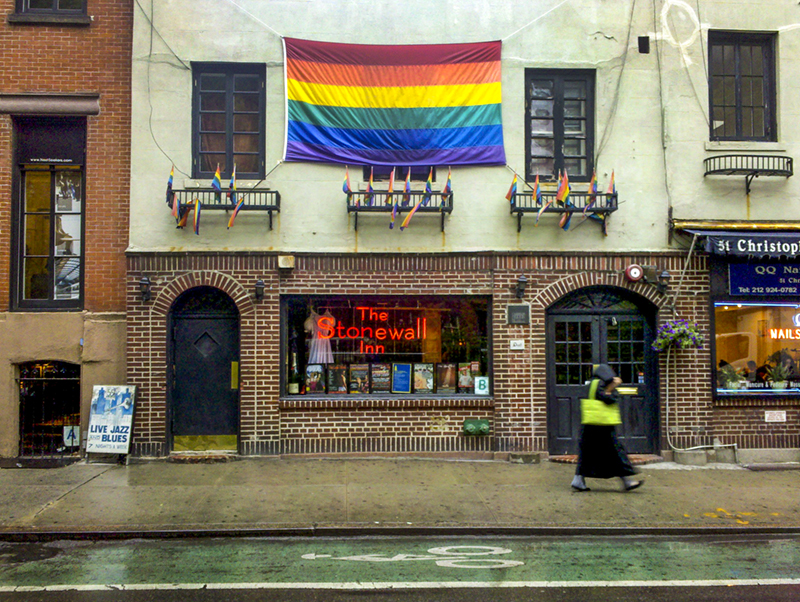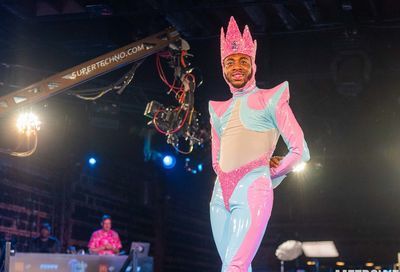Netflix’s “Eldorado” Reveals Queer Berlin During the Nazi Rise
"Eldorado: Everything the Nazis Hate" director Benjamin Cantu shares the stories behind the stories in his new Netflix doc.
By André Hereford on July 8, 2023 @here4andre

“What’s fascinating is if you look at the ’20s in Berlin, everyone just has this very eclectic, extreme image of partying and nightlife,” says Benjamin Cantu, whose new Netflix documentary Eldorado: Everything the Nazis Hate, reveals a more complex portrait of queer Berlin during the rise of the Nazis.
Cantu, German-Hungarian and raised in Berlin, where he’s currently based, professes that before researching Eldorado, he also held fast to legends of Weimar Berlin’s wild parties and sexual liberation.
“But when we dig deeper into it,” he says, “it is much more nuanced and much more controversial, especially because the time in the Weimar era in Germany was politically very, very turbulent, and there was a lot of conflicts within society, but also, on a small scale, for people on the streets. So the tension was quite strong.”
The danger was real, for the queer and Jewish artists, performers, and impresarios who were the life of the party at cabarets like the film’s namesake, the Eldorado.
As depicted through engrossing archival footage and lush dramatizations (separately directed by Matt Lambert), queer regulars at the Eldorado risked harassment and blackmail, as well as being beaten in the streets by the Brownshirts of the Nazi SA, or jailed in police raids. And that was before the Nazis took power.
“I grew up in Berlin, and I always knew, of course, that there is a large LGBTIQ history 100 years ago,” says Cantu, noting that the Eldorado was housed in a building located “in the neighborhood actually where my parents lived, in Schöneberg, but I was never really in touch with it. My colleague, Nils Bökamp, the producer, also had a very good instinct on the subject, and he had the original idea. And once we dove into it, we became obsessed with that period.”
Combining nonfiction and narrative elements — as Cantu did in his debut feature Harvest — the film, co-written with Felix Kriegsheim, recounts that precarious period through the intensely personal stories of several who frequented the Eldorado.
Unsurprisingly, one of those regulars was a high-ranking Nazi himself — Ernst Röhm, leader of the SA, a closeted homosexual, and, as shown in Eldorado, a classic case of self-loathing hypocrisy in power.
On a more tender note, the film also tracks the star-crossed romance of prize-winning German pro tennis player Gottfried von Cramm and his lover Manasse Herbst, a Jewish actor-performer. Gottfried was married to a woman, Lisa, who, according to the movie, didn’t come between Gottfried and Manasse. Rather, it was the Nazis who unleashed tragedy in countless lives dramatized in Eldorado.

“One of the most compelling experiences, or the most touching experiences, when making this film was actually telling the story of Walter Arlen and his young friend from his youth, Lumpi, Fülöp Lóránt,” Cantu says.
“Because when I first talked to Walter, he’d just turned 100 years old — he’s now turning 103 years old — and I just called him and asked him if he’s interested to talk to me about a project that I’m planning. I told him I’m from Budapest, and he instantly opened up and told me his very touching story, where he and Lumpi were very, very close in their youth. And in 1938 they lost track of each other because of the Nazis.”
Arlen, who now resides with his partner “happily a few blocks from the Pacific Ocean,” asked Cantu if the filmmaker could help him find the traces of his dear Lumpi.
“He would not expect that he’s still alive,” explains Cantu, “but he wanted to know for sure. This was on his list in his life, that was very important to him.” Cantu shares the results of the production’s investigation with Arlen on-camera, and the director was moved, he says, to be allowed by Arlen “to tell this very personal, very private story of his life.”
The story of the actual Eldorado came to an end with its forced closure in 1932. Used then as a Nazi propaganda headquarters, the space eventually would become another nightclub, then a drug rehab. “And now today, it’s an organic supermarket,” says Cantu.
“You can completely go into that shop and have no traces of its history whatsoever. It’s totally a fancy organic supermarket, but there is a small writing on top, below the supermarket sign that says the Eldorado. And so people who want to find it can still find it.”
And, as the film points out, people can also still find versions of Nazi-era anti-gay, anti-drag furor around the globe — from an increasing number of attacks, verbal and physical, in Germany, to alarming anti-LGBTQ policies in parts of the U.S.
“I think what the film shows is that the mechanisms are quite similar, that people in power who want to establish a role within a large part of society that is so-called conservative right leaning, pick up on scapegoats or on marginalized groups, and the LGBT community is always very handy for that,” Cantu says.
“This is not the same story that we saw 100 years ago in Weimar Berlin, but it is a repetition, it’s a repeating backlash, whenever it comes in handy, to build up power against the minority, to establish the feeling of power for the majority. So in totalitarian countries, and places where conservative and liberal powers are in struggle, like in the U.S. now, I think it’s unfortunately always repeating.”
Eldorado: Everything the Nazis Hate is available for streaming on Netflix. Visit www.netflix.com.
More from Metro Weekly:
Transgender Flags Banned at Stonewall Monument
The National Park Service barred transgender and Progress Pride flags from the historic LGBTQ monument.
By John Riley on June 24, 2025 @JRileyMW
In another swipe at the transgender community, the national monument honoring what is widely seen as the seminal event of the modern LGBTQ rights movement has erased all mention of transgender and queer people.
Each June, the Stonewall National Monument in New York City typically decorates the fence surrounding Christopher Park -- the small park adjacent to the historic Stonewall Inn and part of the official monument -- with various Pride flags.
In past years, the display has featured a mix of flags -- the familiar six-stripe rainbow Pride flag, the blue, pink, and white transgender Pride flag, and the "Progress" flag, which adds stripes for Black and brown communities and a chevron design incorporating transgender and intersex Pride colors.
JoJo Siwa Drops Pride Show, Rejects ‘Lesbian’ Label
Pop star gushes over romance with Big Brother co-star Chris Hughes while saying she felt pressured to identify as a lesbian — fueling right-wing backlash.
By John Riley on June 26, 2025 @JRileyMW
Last weekend, queer pop star JoJo Siwa abruptly canceled her upcoming performance at a Chicago Pride event scheduled for Sunday, June 29.
Back Lot Bash Chicago, host of the two-day outdoor event, announced on Instagram that Siwa would no longer be performing, citing a "scheduling conflict," according to the Daily Mail.
No further explanation was given for the cancellation.
Siwa, 22, recently released her latest single, "Bulletproof," independently after parting ways with Columbia Records, which had issued her 2022 EP Guilty Pleasure. Neither she nor the label commented on the split.
Support Metro Weekly’s Journalism
These are challenging times for news organizations. And yet it’s crucial we stay active and provide vital resources and information to both our local readers and the world. So won’t you please take a moment and consider supporting Metro Weekly with a membership? For as little as $5 a month, you can help ensure Metro Weekly magazine and MetroWeekly.com remain free, viable resources as we provide the best, most diverse, culturally-resonant LGBTQ coverage in both the D.C. region and around the world. Memberships come with exclusive perks and discounts, your own personal digital delivery of each week’s magazine (and an archive), access to our Member's Lounge when it launches this fall, and exclusive members-only items like Metro Weekly Membership Mugs and Tote Bags! Check out all our membership levels here and please join us today!
The Magazine
-
Most Popular
 Gay Porn Star Austin Wolf Pleads Guilty to Enticing a Minor for Sex
Gay Porn Star Austin Wolf Pleads Guilty to Enticing a Minor for Sex  D.C. Man Sentenced for Selling Fentanyl That Killed Two Gay Men
D.C. Man Sentenced for Selling Fentanyl That Killed Two Gay Men  Christian School Recruits Baseball Player, Then Says No Over Gay Dads
Christian School Recruits Baseball Player, Then Says No Over Gay Dads  Supreme Court to Rule on Trans Youth Sports Bans
Supreme Court to Rule on Trans Youth Sports Bans  Gay Man Says He Was Beaten, Called Slurs in Provincetown
Gay Man Says He Was Beaten, Called Slurs in Provincetown  Judge Drops Charges in Florida Trans Bathroom Case
Judge Drops Charges in Florida Trans Bathroom Case  Chicago Eatery Spoofs Chick-fil-A with “Chick-feel-Gay” Pop-Up
Chicago Eatery Spoofs Chick-fil-A with “Chick-feel-Gay” Pop-Up  Kae Ecstatic Makes Masturbation Month Spiritual and Sexy
Kae Ecstatic Makes Masturbation Month Spiritual and Sexy  Koby Falks, Gay Adult Film Star and OnlyFans Creator, Dies at 42
Koby Falks, Gay Adult Film Star and OnlyFans Creator, Dies at 42  SNAP Cuts Could Hit 2 Million LGBTQ Americans
SNAP Cuts Could Hit 2 Million LGBTQ Americans
 Supreme Court to Rule on Trans Youth Sports Bans
Supreme Court to Rule on Trans Youth Sports Bans  Judge Drops Charges in Florida Trans Bathroom Case
Judge Drops Charges in Florida Trans Bathroom Case  Gay Porn Star Austin Wolf Pleads Guilty to Enticing a Minor for Sex
Gay Porn Star Austin Wolf Pleads Guilty to Enticing a Minor for Sex  Gay Man Says He Was Beaten, Called Slurs in Provincetown
Gay Man Says He Was Beaten, Called Slurs in Provincetown  Virginia Lets Counselors Resume Talk Conversion Practices
Virginia Lets Counselors Resume Talk Conversion Practices  Review: Arena’s Wrinkle in Time Nails Emotion, Fumbles Fantasy
Review: Arena’s Wrinkle in Time Nails Emotion, Fumbles Fantasy  Review: Jurassic World Rebirth Feels Like a Fossil
Review: Jurassic World Rebirth Feels Like a Fossil  Supreme Court Tells Courts to Revisit Transgender Rulings
Supreme Court Tells Courts to Revisit Transgender Rulings  Lia Thomas Loses Swim Titles as UPenn Caves to Federal Pressure
Lia Thomas Loses Swim Titles as UPenn Caves to Federal Pressure  Wisconsin Inmate Gets Life for Killing Black, Gay Cellmate
Wisconsin Inmate Gets Life for Killing Black, Gay Cellmate
Scene
Metro Weekly
Washington's LGBTQ Magazine
P.O. Box 11559
Washington, DC 20008 (202) 527-9624
About Us pageFollow Us:
· Facebook
· Twitter
· Flipboard
· YouTube
· Instagram
· RSS News | RSS SceneArchives
Copyright ©2025 Jansi LLC.













You must be logged in to post a comment.